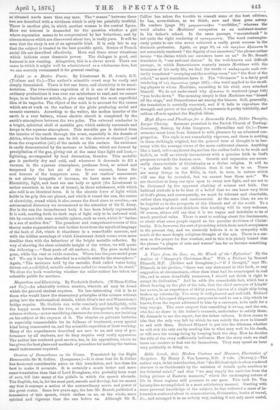Oration of Demosthenes on the Crown. Translated by the Right
Honourable Sir R. Collier. (Longtnans.)—It is clear that Sir R. Collier has bestowed considerable pains on this translation, and has done his best to make it accurate. It is certainly a much better and more exact translation than that of Lord Brougham, who probably from want of care, fell into many of the pitfalls in which the speech abounds. The English, too, is, for the most part, smooth and. flowing, but we cannot say that it conveys a notion of the extraordinary nerve and power of the great orator. Some few years ago, the late Mr. Brandt published a translation of this speech, which strikes us as, on the whole, more spirited and vigorous than the one before us. Although Sir R. Collier has taken the trouble to consult some of the best editions, he has, nevertheless, as we think, now and then gone astray. He renders (page 79) welisper.ze4an "scribbler," whereas the word alludes to lEschines' occupation as an assistant-master in his father's school. In the same passage, "mountebank" is not quite the right rendering of rpprecysnuvritt. The word contemptu- ously points to one who never achieved a really great success in the dramatic profession. Again, on page 80, vi 4;/, irptyirzer ali4Z,Aarra is not accurately rendered "the dignity of our ancestors," the phrase rather means "the claims which our ancestors have on us." So Mr. Brandt translates it, "our national claims." In the well-known and difficult passage, in which Demosthenes coarsely taunts 2Eschines with the meanness of his early life, we find the words Te; Traibegywysisr mop«. cor- rectly translated "sweeping out the waiting-room," not "the floor of the school," as most translators have it. The "Groaners" is a fairly good rendering of .2-67c Aapueri,vatt (page 102),—the word applied to the stroll- ing players to whom 2Eschines, according to his rival, once attached himself. We do not understand why lEiawrs; is rendered (page 103) "you broke down." The meaning simply is that Machines was "hissed off the stage," and Demosthenes sat among the hissers. Still, generally, the translation is carefully executed, and if it fails to reproduce the strength and power of the original, it represents it pretty faithfully, and seldom offends against the English idiom.


































 Previous page
Previous page